-
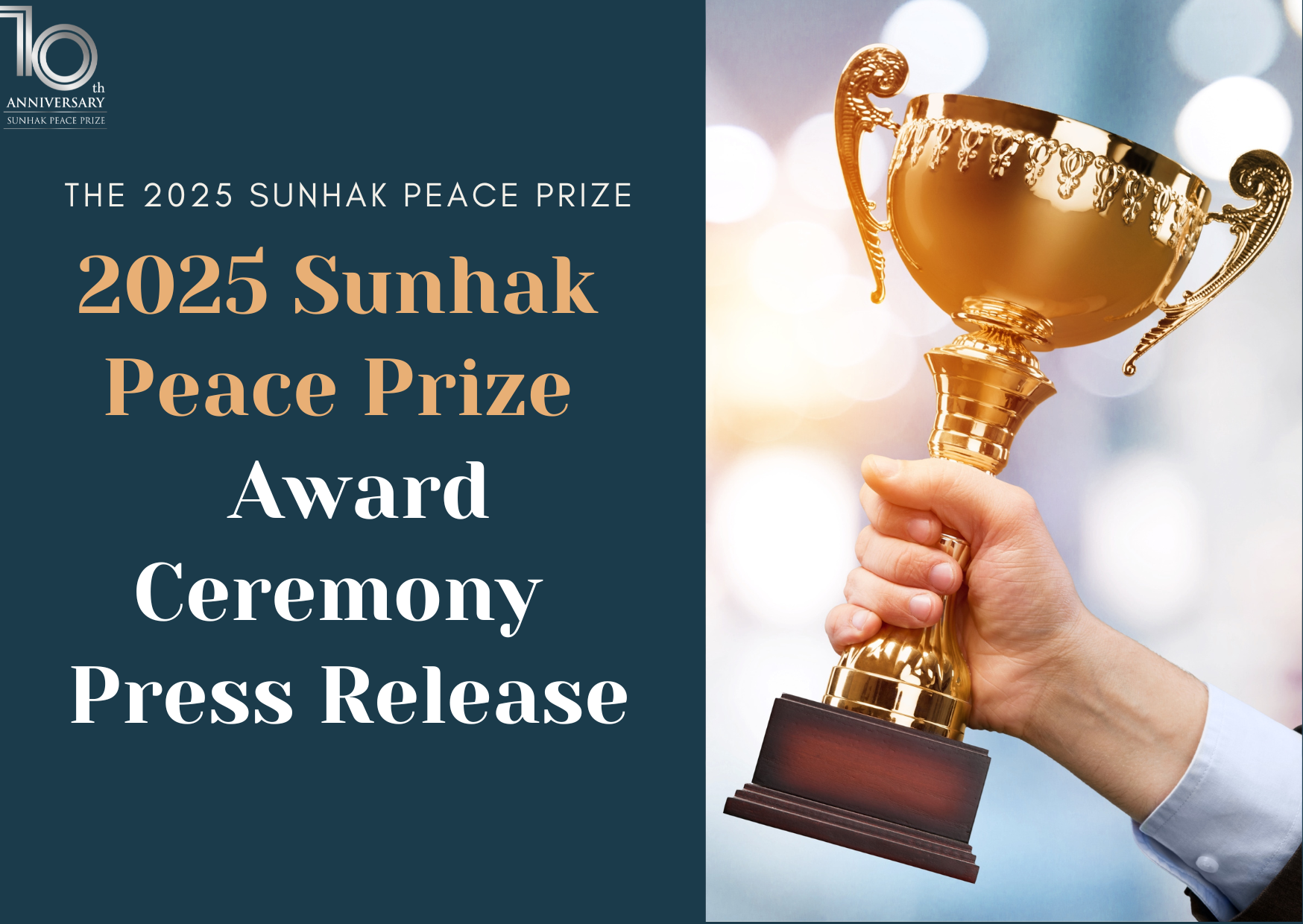
2025 Sunhak Peace Prize Award Ceremony Press Release
2025 Sunhak Peace PrizeAwarded to Patrick Awuah Jr., Hugh Evans, and Wanjira MathaiSEOUL, April 11, 2025 – The Sunhak Peace Prize Committee has decided to award the 2025 Sunhak Peace Prize jointly to Wanjira Mathai , Hugh Evans, and Patrick Awuah Jr. for their significant contributions to educational innovation, global citizenship, and environmental restoration.Wanjira Mathai, Managing Director, Africa & Global Partnerships at the World Resources Institute, is awarded for her outstanding leadership of the AFR100 initiative, aiming to restore 100 million hectares of degraded land in Africa by 2030. Additionally, she has significantly contributed to environmental restoration through the Green Belt Movement, having planted over 51 million trees alongside her mother, Nobel Peace Prize laureate Wangari Maathai.Hugh Evans, co-founder of Global Citizen in Australia, is honored for mobilizing $43 billion to alleviate poverty, enabling essential social services to reach approximately 1.3 billion vulnerable people worldwide.Patrick Awuah Jr., founder of Ashesi University in Ghana, is recognized for revolutionizing education and promoting ethical leadership through innovative STEM programs and achieving gender balance by raising women\'s enrollment to 50%.“These laureates have demonstrated significant, ongoing commitments to addressing critical global challenges,\" stated José Manuel Barroso, Chair of the Sunhak Peace Prize Selection Committee. “Their dedicated efforts reflect a vision of sustainable peace and human advancement.”Due to unforeseen circumstances, the presentation of the Founders’ Award which was initially designated for former Prime Minister Xanana Gusmão of Timor-Leste has been put on hold. Instead, the award will be presented to former President Goodluck Jonathan of Nigeria, recognized for fostering democratic development and peaceful transitions of power, and Prophet Samuel Radebe of South Africa, recognized for his notable contributions to inter-religious cooperation and peacebuilding.The Award Ceremony is scheduled for 10:30 AM on Friday, April 11, 2025, at the Crystal Ballroom of the Lotte Hotel World in Seoul, with 750 distinguished guests expected, including former and current heads of state, as well as prominent global leaders from approximately 100 countries.Each laureate will receive a medal, plaque, and a monetary award of USD 200,000. The ceremony will be live-streamed globally. Contact Information: Sunhak Peace Prize SecretariatTel: +82-2-3278-5160Email: sunhakprize@gmail.comWebsite: www.sunhakpeaceprize.org
-
- 1,919
-
- 9 April 2025
-
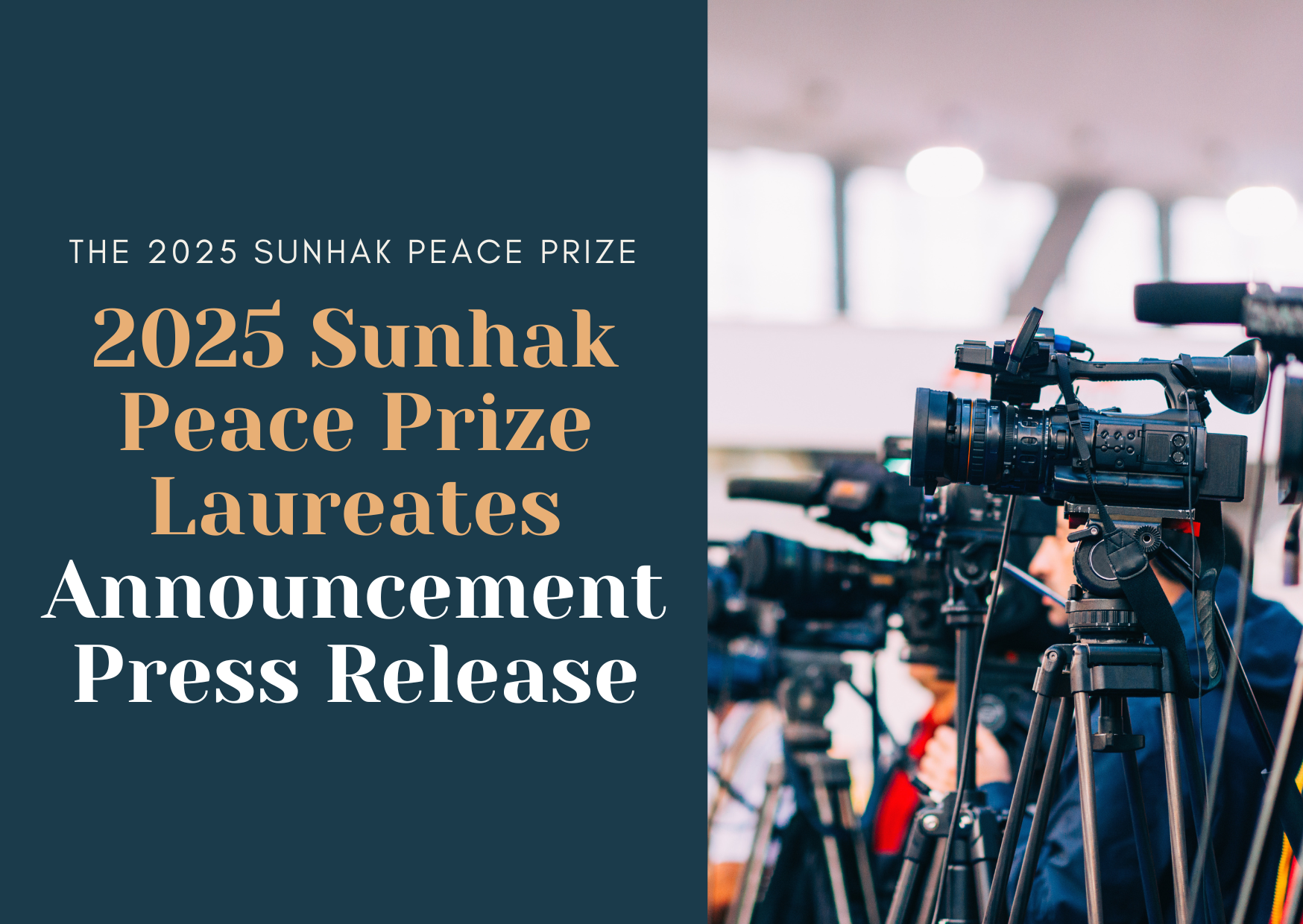
2025 Sunhak Peace Prize Laureates Announcement Press Release
2025 Sunhak Peace Prize: Honoring Global Leaders in Peace Innovation Seoul, January 15, 2025 – The Sunhak Peace Prize Committee, chaired by José Manuel Durão Barroso, former President of the European Commission, has announced the recipients of the 2025 Sunhak Peace Prize. The main award will be shared by Patrick Awuah Jr., Founder and President of Ashesi University, Hugh Evans, Co-Founder and CEO of Global Citizen, and Wanjira Mathai, Regional Director for Africa at the World Resources Institute. Transformational Leadership for Global Peace Announcing the winners, Chairman Barroso emphasized, “The 2025 Sunhak Peace Prize highlights visionary leaders who have turned the ideals of peace into actionable and sustainable solutions. These laureates have boldly addressed global challenges and spearheaded transformative change.” Patrick Awuah, Jr.: Revolutionizing Education in Africa Patrick Awuah has reshaped the higher education landscape in Africa through the establishment of Ashesi University. By fostering an innovative academic environment focusing on STEM education, ethical leadership, and entrepreneurship, he has empowered countless young Africans to excel. Over 90% of Ashesi graduates secure meaningful employment or launch successful businesses. Women comprise 50% of its graduates, advancing gender equity across the continent. Hugh Evans: Mobilizing Global Action Against Poverty Hugh Evans revolutionized the fight against poverty through his organization, Global Citizen. His efforts have mobilized approximately $43.6 billion for poverty eradication and development programs, directly impacting over 1.3 billion people worldwide. Advocated at G7, G20, and UN platforms to mobilize financial and policy commitments from world leaders, driving global progress toward achieving the Sustainable Development Goals (SDGs). Empowered global citizens to drive 30 international policy changes addressing poverty, inequality, and climate crises. Wanjira Mathai: Championing Environmental Restoration in Africa Wanjira Mathai pioneered the integration of environmental restoration with economic development. Through initiatives like the Green Belt Movement, she: Planted over 51 million trees, combating deforestation and soil erosion. Revitalized local economies and created employment opportunities for women. Led the AFR100 initiative to restore 100 million hectares of land across Africa by 2030, contributing significantly to climate resilience. The founder of the Sunhak Peace Prize, Dr. Hak Ja Han Moon, stated in her welcoming address, “Over the past decade, the Sunhak Peace Prize has identified and honored individuals who have dedicated themselves to addressing urgent global challenges based on its three core values: respect for human rights, reconciliation of conflicts, and ecological conservation.” She further emphasized, “The lives of the laureates have been a vivid and inspiring testament to how peace can be realized through concrete actions and cultural transformation.” She also pledged to continue discovering outstanding global leaders to expand the vision for peace worldwide. Award Ceremony Details The 2025 Sunhak Peace Prize Award Ceremony will take place on Friday, April 11, 2025, at 10:30 PM at the Lotte Hotel in Jamsil, Seoul, South Korea. The hybrid event will be held both in-person and online. Each laureate will receive a cash prize of $200,000, along with a medal and a plaque. For more information, please visit www.sunhakpeaceprize.org. Media Contact: Tel: +82-2-3278-5158 Mobile: +82-10-2936-9138 Email: sunhakprize@gmail.com
-
- 1,550
-
- 15 January 2025
-
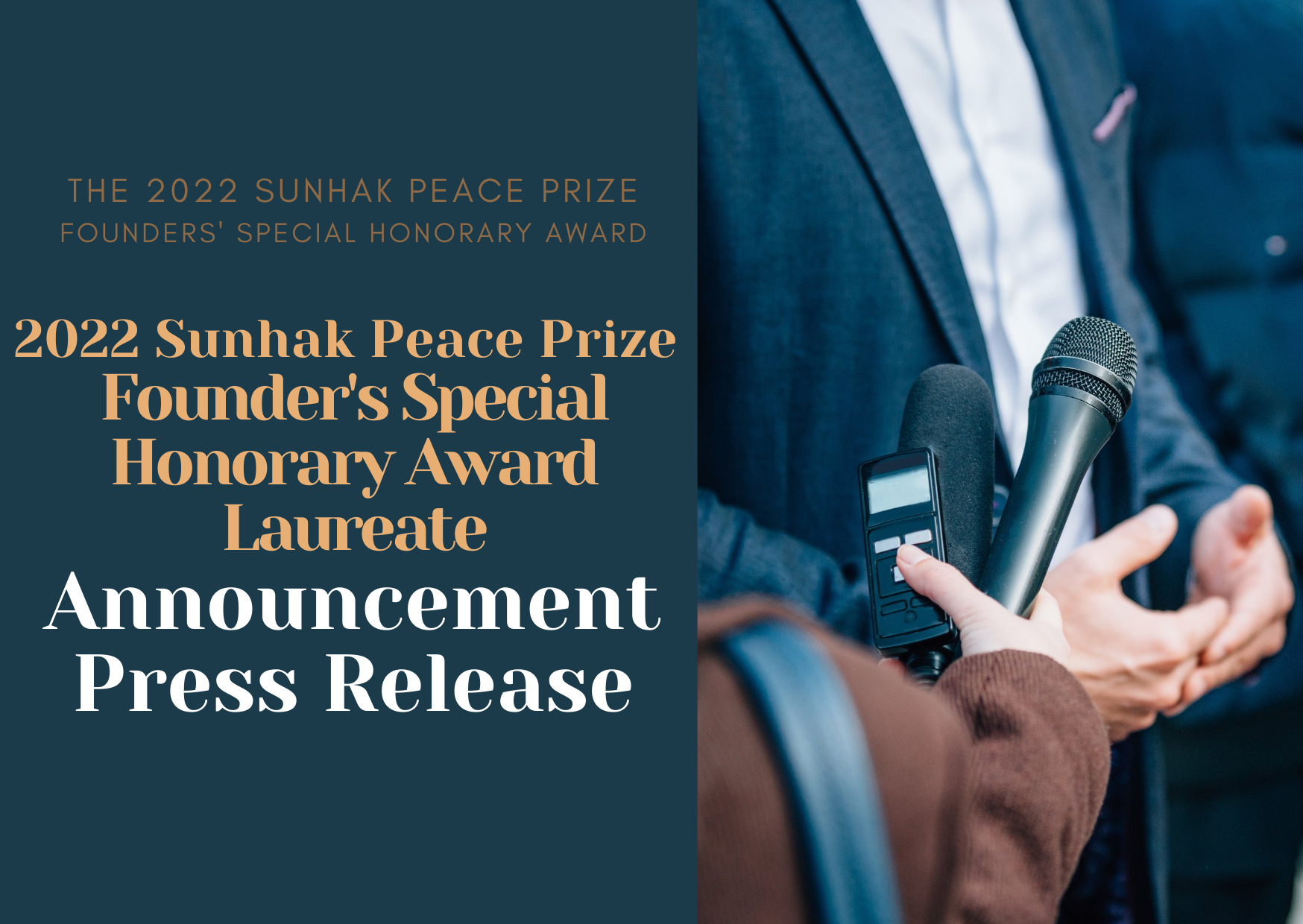
2022 Sunhak Peace Prize Founders' Award Laureates Announcement Press Release
● H.E. Samdech Hun Sen (70 years old, Prime Minister of the Kingdom of Cambodia) selected for outstanding leadership for the development of Southeast Asia and supporting the new peace process on the Korean peninsula ● Award ceremony to be held on Saturday, February 12 at 9:30 AM at the HJ Global Art CenterOn February 7, 2022, the Sunhak Peace Prize Foundation (Chairman Thomas G. Walsh, Chairman of Universal Peace Federation International) announced that H.E. Samdech Hun Sen (70 years old, Prime Minister of the Kingdom of Cambodia) was selected as the recipient of the 2022 Founders’ Award. He was recognized for his outstanding leadership for the sustainable development of Southeast Asia and his role as co-chairman of the ‘Summit for Peace on the Korean Peninsula in supporting the new peace process on the Korean peninsula proposed by Dr. Hak Ja Han Moon.’ Dr. Youngho Yun, Director-General of the Universal Peace Federation said, “The founder has emphasized that peaceful interdependence, mutual prosperity, and universally shared values are essential in order to build a world of everlasting peace. Prime Minister Hun Sen is practicing those values to build a path toward a brighter future in Southeast Asia and the Korean Peninsula.” H.E. Samdech Hun Sen has promoted international cooperation for peace by actively participating in various international forums and peace initiatives, including the Universal Peace Federation (UPF), demonstrating outstanding leadership especially for the sustainable development of Southeast Asia. The Kingdom of Cambodia held chairmanship of the Association of South-east Asian Nations (ASEAN) in 2002, 2012, and 2022 and hosted the Asia-Europe Meeting (ASEM) in 2021, promoting multilateral cooperation for the peace and progress in Asia. In particular, Prime Minister Hun Sen has shown continuous leadership for the prosperity of the six Mekong basin countries (China, Cambodia, Thailand, and Myanmar) that have suffered from poverty as a result of the aftermath of the war that lasted decades. He is taking the lead in bridging the gap between Mekong countries and building a prosperous Southeast Asian community by leveraging its natural and human resources. Above all, Prime Minister Hun Sen served as the co-chair of the Korean Peninsula Peace Summit in line with the Heavenly Unified Korea peace regime proposed by Dr. Hak Ja Han Moon as a new peace process on the Korean Peninsula. The Summit for Peace on the Korean Peninsula is an international organization launched in September 2021 by leaders and intellectuals from 157 nations that have diplomatic ties between North and South Korea for peace on the Korean peninsula. He has been working with worldwide leaders to work together and create a breakthrough in the deadlock relationship between North and South Korea. The Summit for Peace on the Korean Peninsula held an international conference in honor of the vision of Rev. Dr. Sun Myung Moon and Dr. Hak Ja Han Moon, who dedicated their lives for peace and reunification of the Korean peninsula. Rev. Moon and Dr. Moon have risked their lives to enter North Korea and hold a peace summit with Kim Il-sung, the first Supreme Leader of North Korea. The 2022 Founders’ Award Ceremony will be held and streamed live on Saturday, February 12 at 10:00 AM at the HJ Global Art Center.
-
- 3,014
-
- 15 February 2022
-
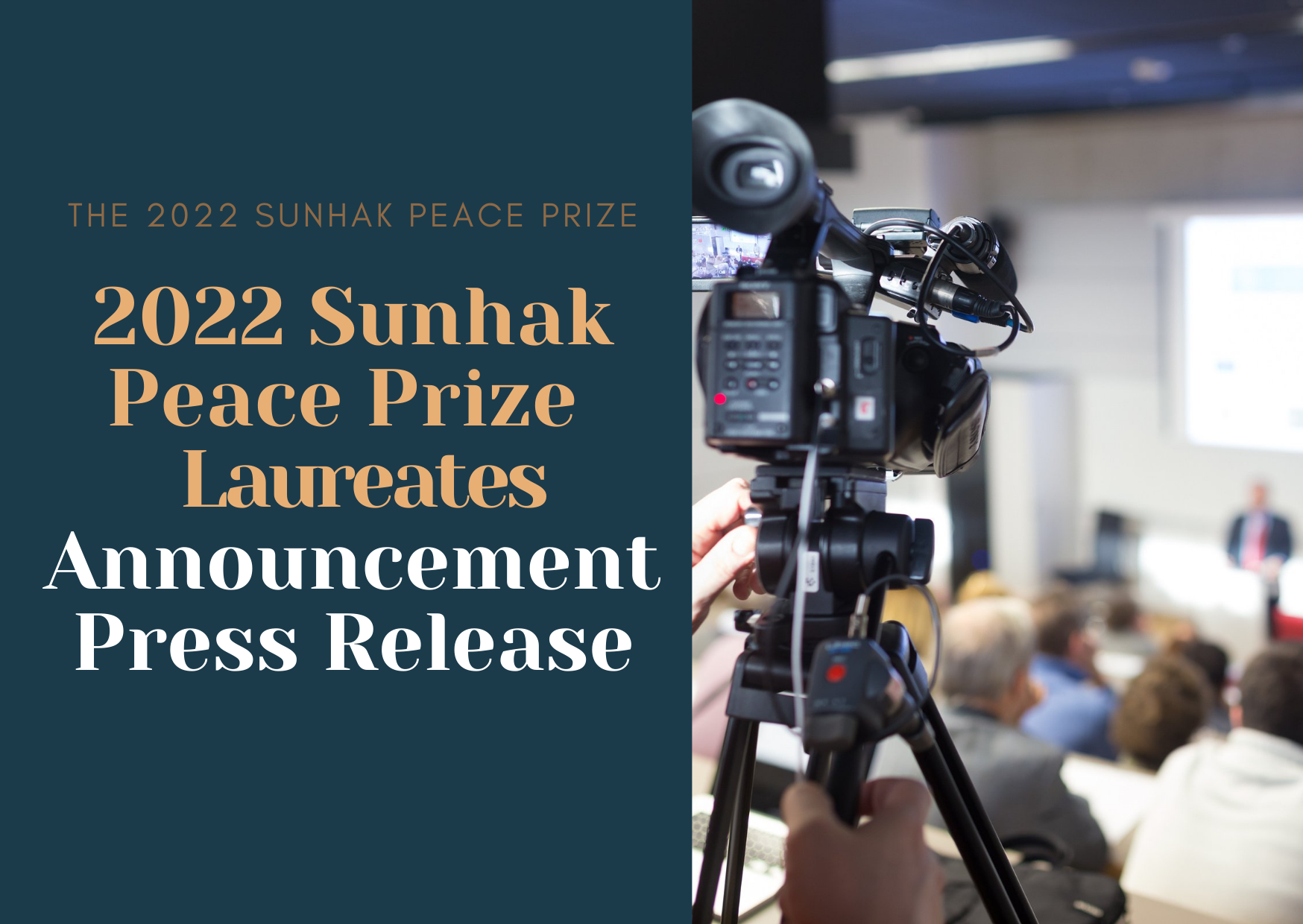
2022 Sunhak Peace Prize Laureates Announcement Press Release
On February 7, 2022, the Sunhak Peace Prize Committee (Chairman Jose Manuel Barroso, former President of the European Commission) announced that the 2022 Sunhak Peace Prize laureates would be Dame Sarah Catherine Gilbert (age 59), Professor of Vaccinology at Jenner Institute, University of Oxford and Gavi, the Vaccine Alliance founded in 2000. Professor Sarah Gilbert was recognized for the key role she played in protecting billions of lives in less developed countries by co-developing the Oxford-AstraZeneca coronavirus vaccine, which is easier and less expensive to manufacture, store and transport. Gavi, the Vaccine Alliance was recognized for its contributions in coordinating the COVAX Facility initiative, which aims to provide fair and equitable access to the Covid-19 vaccine worldwide. Professor Sarah Gilbert viewed the Covid-19 pandemic as a common threat to humanity and approached vaccines as a global public good. She stood firm that the vaccine she developed was not for profit, which has been delivered to 182 countries around the globe. Gavi, the Vaccine Alliance is the largest international cooperation mechanism that contributed to improving the overall health of humanity by providing vaccination in developing countries. Immediately after the coronavirus outbreak, it coordinated the COVAX Facility, a global collaboration to support manufacturing of Covid-19 vaccines and negotiate their pricing for fair and equitable access. More than one billion doses have been distributed in 144 nations worldwide through this effort. Furthermore, Gavi has supported the immunization of more than 820 million children, reaching almost half of all children worldwide, preventing over 14 million deaths since its founding in the year 2000. In particular, the number of children immunized with the DPT vaccine in 73 developing countries increased from 59% in 2000 to 81% in 2020, reducing the child mortality rate by 50%. Chairman Jose Manuel Barroso added, “Paradoxically, the Covid-19 pandemic is giving us an opportunity to drive real change. We do not know when the next pandemic will occur, but the Covid-19 has taught us that solidarity and cooperation based solely on humanity are the solutions to this global crisis.”
-
- 3,043
-
- 15 February 2022
-
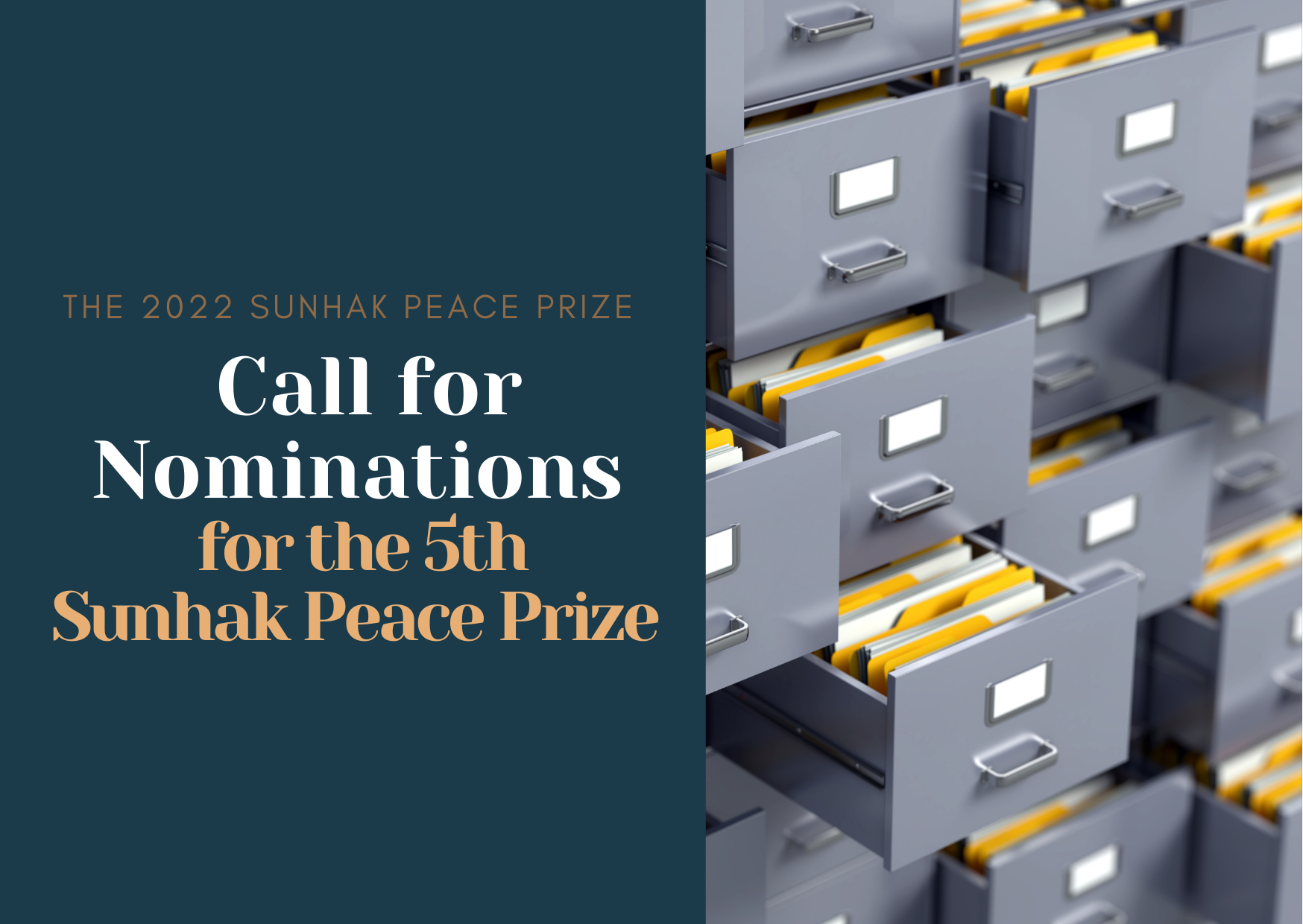
“The Sunhak Peace Prize Committee is accepting nominations for the 5th Sunhak Peace Prize”
● Nominations may be submitted up until July 31, 2021The Sunhak Peace Prize honors distinguished individuals or organizations that have contributed significantly to peace and to the welfare of future generations. In particular, the Committee considers three core areas of accomplishment in the evaluation of candidates: Sustainable Human Development, Conflict Resolution, and Ecological Conservation. Sunhak laureates are selected biannually by an international committee, and receive an award in the amount of $1,000,000. Dr. Hak Ja Han Moon founded the Sunhak Peace Prize to continue the legacy and vision of her late husband, Rev. Dr. Sun Myung Moon, who founded the Universal Peace Federation and dedicated his life to the promotion of peace, seeking to build a world where all people live together in harmony. The inaugural award was given in 2015. The 5th Award Ceremony will take place in 2022. Criteria for Evaluation of Nominees: - Contributions to the areas such as sustainable human development, conflict resolution, or ecological conservation - Improving the quality of life of people from diverse nations, races, religions and cultures for the sake of peace Nominators are to complete the candidate nomination form, along with relevant supporting material, detailing the candidate\'s achievements. The nomination must be submitted to the Sunhak Peace Prize Secretariat by July 31, 2021. The prize committee will decide on the final Sunhak Peace Prize Laureate(s) in December 2021. The official announcement will be made soon thereafter. The Award Ceremony will be held in April 2022, in South Korea. The nomination form can be downloaded from the official website (sunhakpeaceprize.org). The first Sunhak Peace Prize in 2015 was awarded to Mr. Anote Tong, former President of Kiribati, for his efforts to raise awareness of climate change and rising sea levels; and, Dr. Modadugu Vijay Gupta, who increased the productivity of fisheries through the development of aquaculture methods. The second award in 2017, which focused on the global refugee crisis, was given to Italian surgeon Dr. Gino Strada, and to educator Dr. Sakena Yacoobi. The laureates of the third award in 2019, which focused on peace and development in Africa, were Dr. Akinwumi Adesina, President of the African Development Bank, and Waris Dirie, founder of Desert Flower Foundation. The 2020 Sunhak Peace Prize was awarded to President Macky Sall of the Republic of Senegal and Bishop Munib A. Younan, the International Honorary President of Religions for Peace. Marking the centenary of the Rev. Sun Myung Moon, a special Founders\' Centenary Award was presented to former UN Secretary-General Ban Ki-moon. Contact: Sunhak Peace Prize Committee Secretariat sunhakpeaceprize@gmail.com TEL: +82-2-3278-5158, FAX: +82-02-3278-5198 Source: The Sunhak Peace Prize Committee
-
- 6,814
-
- 10 May 2021
-
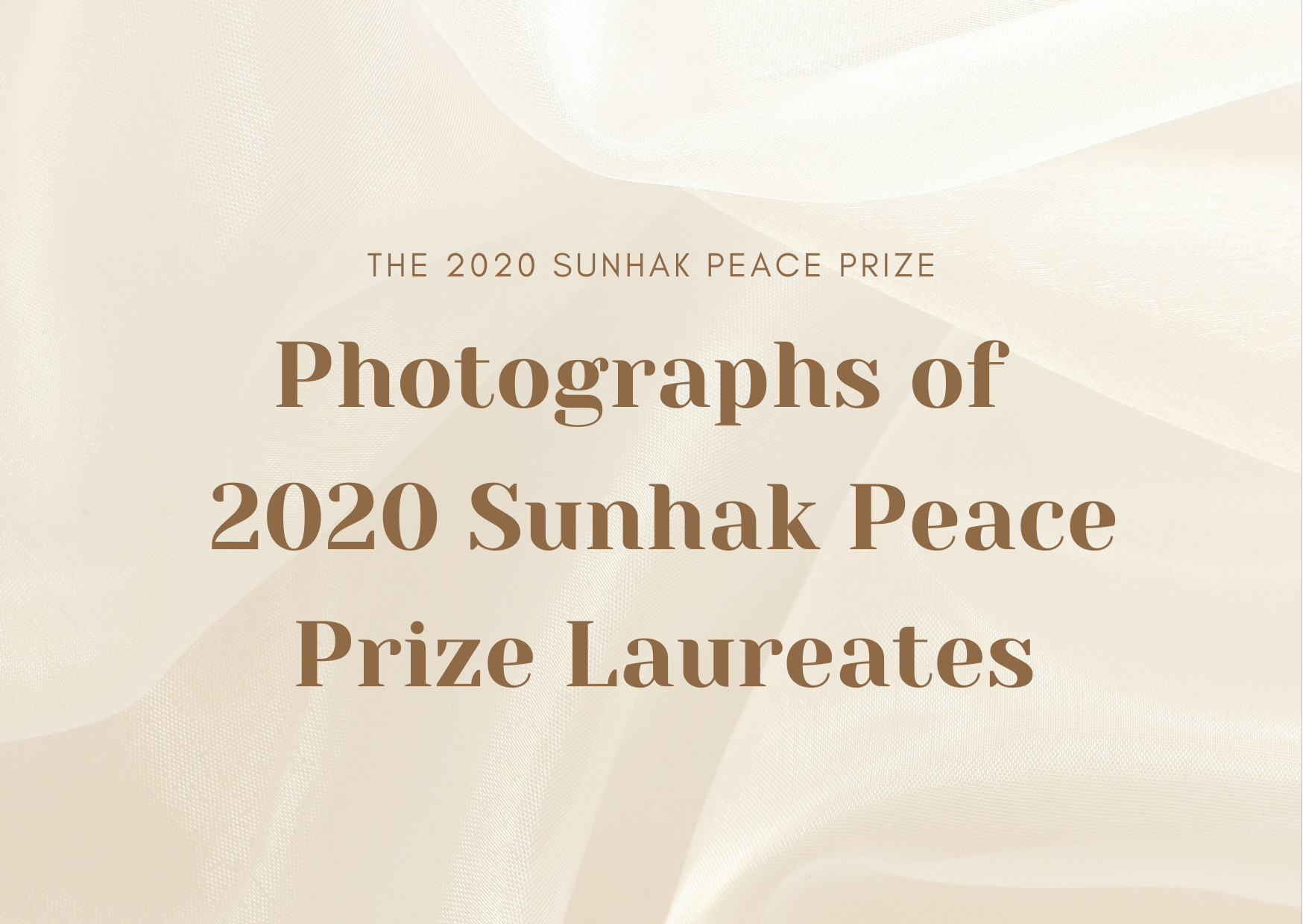
Photographs of 2020 Sunhak Peace Prize Laureates
-
- 3,031
-
- 2 March 2021
-
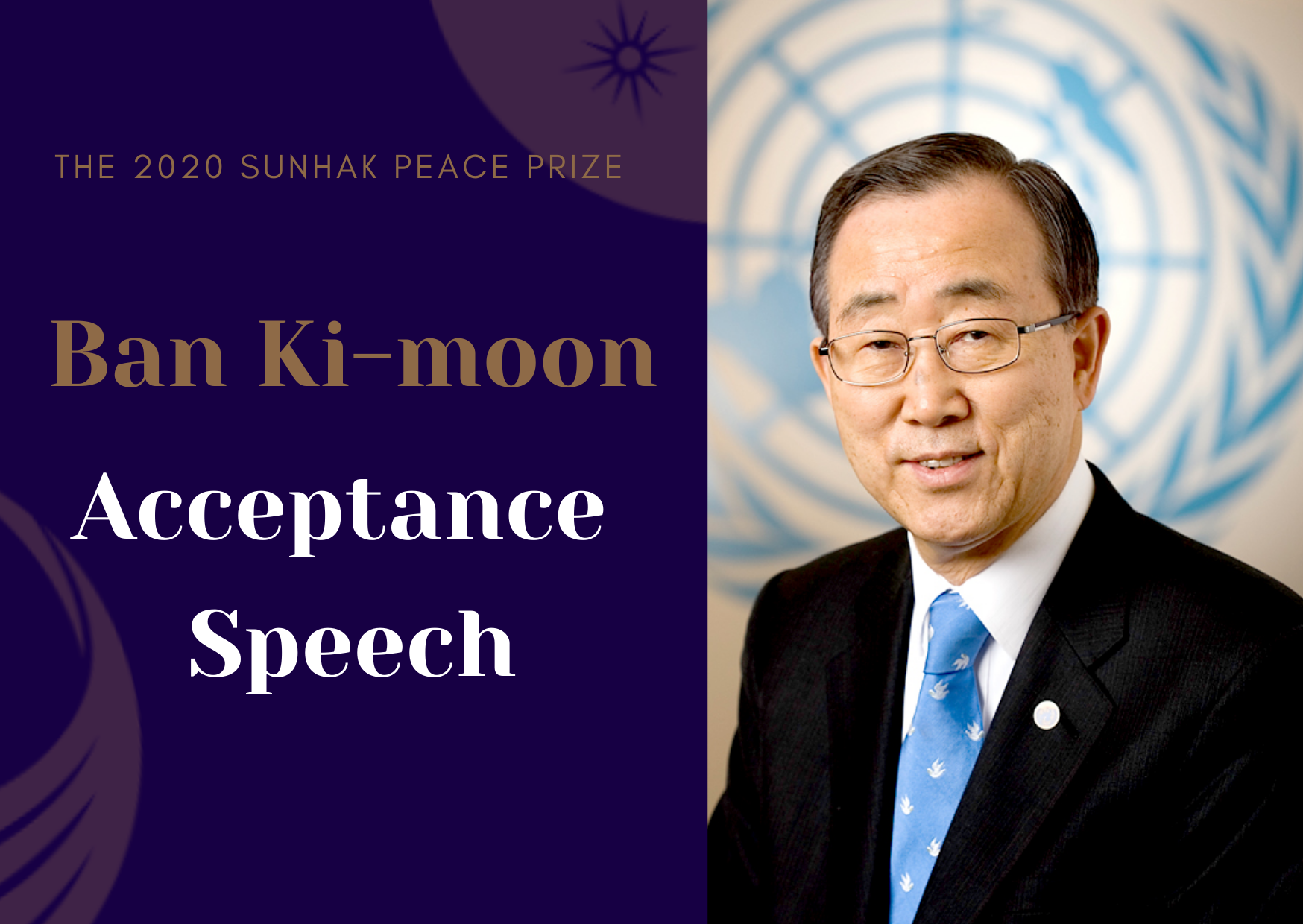
Ban Ki-moon Acceptance Speech
Acceptance Remarks at the SH Special Peace Award Ceremony5 February 2020, Seoul, KoreaThank you for your warm introduction.Dr. Hak Ja Han, Universal Peace Federation Founder,Sunhak Peace Prize Foundation Members,Distinguished Guests, Ladies and Gentlemen,It is my great privilege to stand before you this evening and humbly accept the 2020 Sunhak Peace Prize.I’m incredibly grateful for this esteemed honor, and it is quite meaningful to follow in the footsteps of the previous luminary awardees you have bestowed this honor upon.My special recognition goes to Dr. Hak Ja Han for her visionary patronage of this award, as well as for her longtime advocacy efforts in support of world peace, global citizenship, and sustainable development issues.I also take this opportunity to commend the impressive work and forward-thinking vision of the Sunhak Peace Prize Foundation.The critical efforts by the Sunhak Peace Prize Foundation are essential as we collectively strive to expand essential understanding, cooperation, and tolerance on the road to world peace and global sustainability.In this connection, I simply couldn’t be more proud to receive this award intended to further the ideals of such a pioneering individual who so firmly believed in the importance of peace, human development, coexistence, and environmental protection.My deepest gratitude goes to the Sunhak Peace Prize Foundation Members for this very special honor.Distinguished Guests, Ladies and Gentlemen,Our world is changing and this is bringing many new challenges and uncertainties to the geopolitical and economic order.Multilateral cooperation is viewed with increasing skepticism just as the world needs it the most. Human rights are under threat as nationalism spreads. Development and humanitarian funds are being slashed.And our climate crisis is deepening as wildfires burn, sea levels rise higher, and temperatures continue to surge.Under this backdrop of instability and waning internationalism, I firmly believe that we must work together through expanded partnerships and cooperation, as well a driving commitment to global citizenship, to cope with these seemingly insurmountable challenges.During my ten-year tenure as United Nations Secretary-General, I strived to execute my leadership duties by leveraging the power of partnerships and promoting the spirit of global citizenship.This was critical in bringing the entire world together to agree to the UN’s 2030 Agenda and its Sustainable Development Goals, as well as the Paris Climate Agreement.These were two of my biggest achievements leading the UN as they provide humanity, and our planet, with a collaborative blueprint to ensure the future we want.And global partnerships, including the active participation of nonprofit organizations, civil society groups, religious organizations, philanthropists, and other key stakeholders like you, are necessary if we are to deliver on the United Nations’ development and climate commitments.But to establish long-term solutions, achieve world peace, and save our rapidly warming planet, we need inclusive and participatory action from all global citizens.This includes, especially, young people, as they are absolutely essential to solving so many of the world’s challenges such as achieving the SDGs, tackling climate change, and building peace and resolving conflicts.As such, I’ve been trying my best to help elevate global citizenship as a driving vision for young, transformative leaders to help us forge a more peaceful and sustainable world.In this regard, two years ago I launched the Ban Ki-moon Centre for Global Citizens, based in Vienna, Austria to help provide young people and women with a greater say in their own destiny, as well as a greater stake in their own dignity.Distinguished Guests, Ladies and Gentlemen,The actions we take in the next ten years will be critical to ensure the future viability of both humanity and our planet. So we must work hard to illuminate true peace.What type of peace? I am reminded of the words of President John F. Kennedy who said, “I am talking about genuine peace, the kind of peace that makes life on earth worth living, the kind that enables men and nations to grow and hope and build a better life for their children …not merely peace in our time, but peace for all time.”In 2020, the year of the rat, and beyond, we all share a common destiny grounded in sustainability, peace, and prosperity. Let’s expand our unified efforts to realize this shared destiny for all global citizens in the years to come.I thank you for your attention and this great honor. /END/
-
- 3,244
-
- 2 March 2021
-
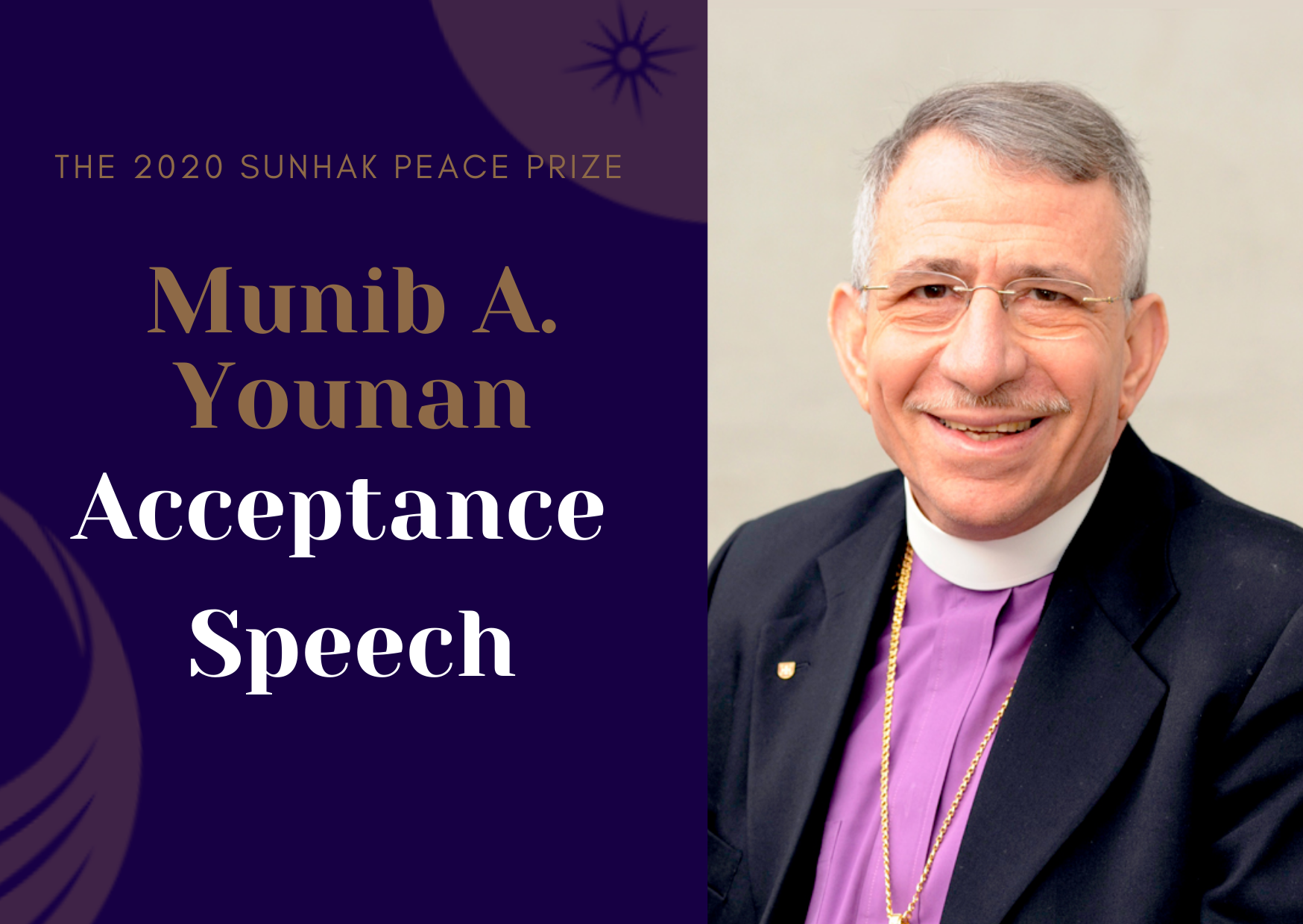
Munib Younan Acceptance Speech
The grace of our Lord Jesus Christ, the love of God, and the communion of the Holy Spirit be with you all. Amen.Acceptance Speech for the Sunhak Peace Prize 5 February 2020Bishop Dr. Munib A. Younan Munib.younan@icloud.com Your Excellencies, Eminences. Graces, Ladies and Gentlemen,First of all, I humbly stand here as a servant of God to accept this Sunhak Peace Prize. I would like to thank Dr. Hak Ja Han Moon, the founder of the Sunhak Peace Prize, and your late husband, Rev. Sun Myung Moon, for your vision of peace as “one family under God.”I also thank those who suggested my name, as well as the work of the Sunhak Peace Prize Committee, Chaired by Dr. Hong Il-sik. I also thank The Sunhak Peace Prize Foundation, and all of you who have gathered here today.And, most assuredly, I thank all those who believe in the mission of peace my Lord and Savior Jesus Christ has put on my heart.I stand here in Seoul in appreciation of the Korean people for their resilience and industriousness. I also extend my appreciation to the Korean churches, who are preaching Christ’s Gospel of love and are advancing the Kingdom of God in this beautiful country. I want to ask you to continue the good work of unity of the one Church of Christ in Korea.I have a special admiration for President Moon Jae-in, President of South Korea. I respect and admire his relentless efforts to unify this peninsula. I stand with him and fully support his God-given mission, for I see that there is no other way forward for the people of this peninsula but to be finally unified under one flag and one leadership, as one unified Korea.Sometimes people ask me: Why do you work for peace through interfaith dialogue? My answer is: To work for peace based on justice is not only political. It is the core of the biblical message. From my perspective, it is Christ who calls me to serve the suffering humanity and to return to them their God-given dignity. As a Christian, I believe Jesus called us to be peacemakers, not peace-talkers. St. Paul has written: “For he is our peace; in his flesh he has made both groups into one and has broken down the dividing wall, that is, the hostility between us.” (Ephesians 2:14) In Christ, God was reconciling the world to God’s self, not counting the trespasses against them, and entrusting to us the ministry of reconciliation (2 Corinthians 5:19). For this reason, I am called for this ministry or reconciliation, for there can be no peace without justice and no reconciliation without forgiveness. Therefore, I will continue to work for peace based on justice until the last breath of my life.In his New Year’s message of 2020, His Holiness Pope Francis said: “Peace is a journey of hope.” I completely agree, for only those who possess hope can endure and thrive on the journey toward peace. Peace is dependent upon respect for the dignity of the Other, regardless of gender, ethnicity, race, religious or political affiliation. All of us are made in the image of God and are children of God. All of us are one family of God.Mutual recognition of each other’s dignity is the foundation of our faith and of a new world order, one that is built and based upon truth, justice, love and freedom. This vision of a peaceful life together is the central message of every religion and is integral to the mission of every religious community. This is the reason I call on all religious leaders to raise their voices prophetically for peace based on justice, and to speak boldly against the wave of hatred and oppression making its way across the globe today. Religions must be the conscience of the world. Religious leaders must join their diverse voices into a symphony of peace, to disrupt the others shouting ugly messages of injustice, hatred, racism and oppression. Religious leaders must always be witnesses to the protection of life.World leaders today talk about our shared security, but I challenge them instead to talk about our shared well-being. A commitment to a shared well-being calls us to work for a safer world, a world without weapons of destruction. Talks are taking place even now on the non-proliferation of weapons, but in fact there is still competition between the nations over nuclear weapons, and countries still struggle to enact sensible gun laws. On these issues, religious leaders must together state clearly that guns and bombs and other arms only exist to destroy life, and we are only and always to be witnesses for the protection of life.When we see the image of God in the other, we can do nothing else but work for a nuclear- free world and weapon-free cities and states. Certainly, we must at least insist that our children have violence-free schools, neighborhoods, and societies. When will we hold our world leaders to task, demanding a general disarmament of all weapons of destruction: nuclear, chemical, biological, and the newly emerging tools of death? Korea, and the Middle East, will be much safer without arms and weapons. We need justice, not weapons. It is my vision that all states use the funds allocated for weapons to kill, and instead invest them in economic development, equality, gender justice, and freedom of religion. Pope John Paul II said: “We are a human family. ‘Love your neighbor’ has global dimensions in aninterdependent world.”Jesus said, “I have come that you may have life, and life abundant.” (John 10:10) This is a promise to all humanity, that all are intended to possess dignity, and the world is intended to know a shared well-being among all nations and ethnicities.How do we achieve such abundant life?In a polarized world, religious leaders can affect our future toward this end by promoting the common values of living together in dignity, working for peace, and combatting fanaticism, fundamentalism, and extremism. Religious extremists who use religion, and manipulate God for their own selfish purposes, are an existential threat to humanity.Extremism is a blatant perversion of religion and is always the antithesis of love. For this reason, it is the role of religious leaders today to boldly and prophetically combat any kind of extremism within their own religion. It is imperative that we teach our own communities to see and value the image of God in those who are different from us. As it is written: “Those who say, “I love God,” and hate their brothers or sisters, are liars; for those who do not love a brother or sister whom they have seen, cannot love God whom they have not seen.” (1 John 4:20)This is our mutual call: To teach love, never division or hatred. Religious leaders are called and sent to influence our communities to be brokers of robust moderation and agents of love in a fractured world. As the prophet Amos says, “Let justice roll down like waters, and righteousness like an ever-flowing stream.” (Amos 5:24) With God’s love guiding us, we can always be instruments of peace.Fear of the other is the source of all conflict, violence, and war. Every day, we hear of another politician seeking to implant seeds of fear, seeking to grow a harvest of hatred among his or her people. It is no wonder that religious extremism, secular populism, and racism are spreading throughout our societies. We are not powerless in the face of this epidemic. We can, and we must, stand up and resist with all our might this disease of fear and xenophobia. We can inoculate our youth and societies against this disease by boldly proclaiming love, mercy, understanding, and trust of others—even so-called enemies. We can protect our communities from this disease by rising up against such sick ideologies as white supremacy, anti-Semitism, Islamophobia, Christianophobia, xenophobia, patriarchy, and every other kind of evil. It is God’s call to us to transform a world filled with hatred into a culture of harmony and love.Last year, we celebrated 70 years of the United Nations Human Rights Charter. However, all these decades later we still live with violations of human rights in many member states. We must ask ourselves: do we have one common standard for the implementation of human rights, or do we have a double standard? Do we honor one standard for the so-called “friend countries” and another for the so-called “enemy countries”? Religious people, and all people of good conscience, must loudly and boldly raise their voices to insist upon one standard of human rights for all peoples and all states. Here it is exactly the concept of the image of God, present in every human being, which both compels and propels us forward into a future in which all humans are valued equally.When people know that I am an Arab Palestinian Christian coming from Jerusalem, they ask me if I am optimistic or pessimistic about the future. It is true that the political situation in the whole Middle East, especially regarding the Israeli-Palestinian conflict, is very tense. It seems that the end game is in the hands of the powerful. However, I continue to believe in and promote a two-state solution, with the State of Palestine living alongside the State of Israel, on 1967 borders, together enjoying justice, peace, equity, and reconciliation. I continue to promote and insist on a Jerusalem that is shared between the three religions— Judaism, Christianity, and Islam—with full respect for the historic status quo of the holy places, and with respect to the Hashemite King’s custodianship of Christian and Muslim holy places. Jerusalem must be a shared capital for the State of Israel and the State of Palestine, for the sake of peace for both nations.As long as I live, I will teach my children and grandchildren to see the image of God in Israelis, and I pray that my Israeli neighbors will see the image of God in me and my fellow Palestinians. Once we truly recognize the image of God in the Other, then we can mutually recognize and protect each other’s human, civil, political, national, and religious rights. Only then will our Holy Land become truly holy, an equal home for Israelis and Palestinians. As long as there is a Living God of justice, I know there is hope for both groups to live in freedom, peace, justice, and dignity.Before I end, I would like to thank my family, and especially my good wife Suad, along with my children and their families. They have always supported me in this mission of peace.They know the risks of walking this path toward peace for all people, and yet they remain committed to this vision, not only for themselves, but for all children of the world. I am so very grateful for them and humbled by their love and support.Again as an Arab Palestinian Christian Evangelical Lutheran and a Palestinian refugee, I would like to express my gratitude for receiving this prestigious prize. Receiving this prize does not graduate me from continuing to do the holy work of interfaith dialogue and peacebuilding. On the contrary, I feel that this moment motivates me to continue to be a witness for peace, a broker of justice, a defender of human rights, a minister of reconciliation, and an apostle of love. Please, continue to pray for me, and for all those sisters and brothers of any religion, who join us in the challenging call to bring peace based on justice to this one world we all inhabit. “Blessed are the peacemakers for they will be called children of God.” (Matthew 5:9) May God bless you and keep you all the days of your life.
-
- 3,091
-
- 2 March 2021
-
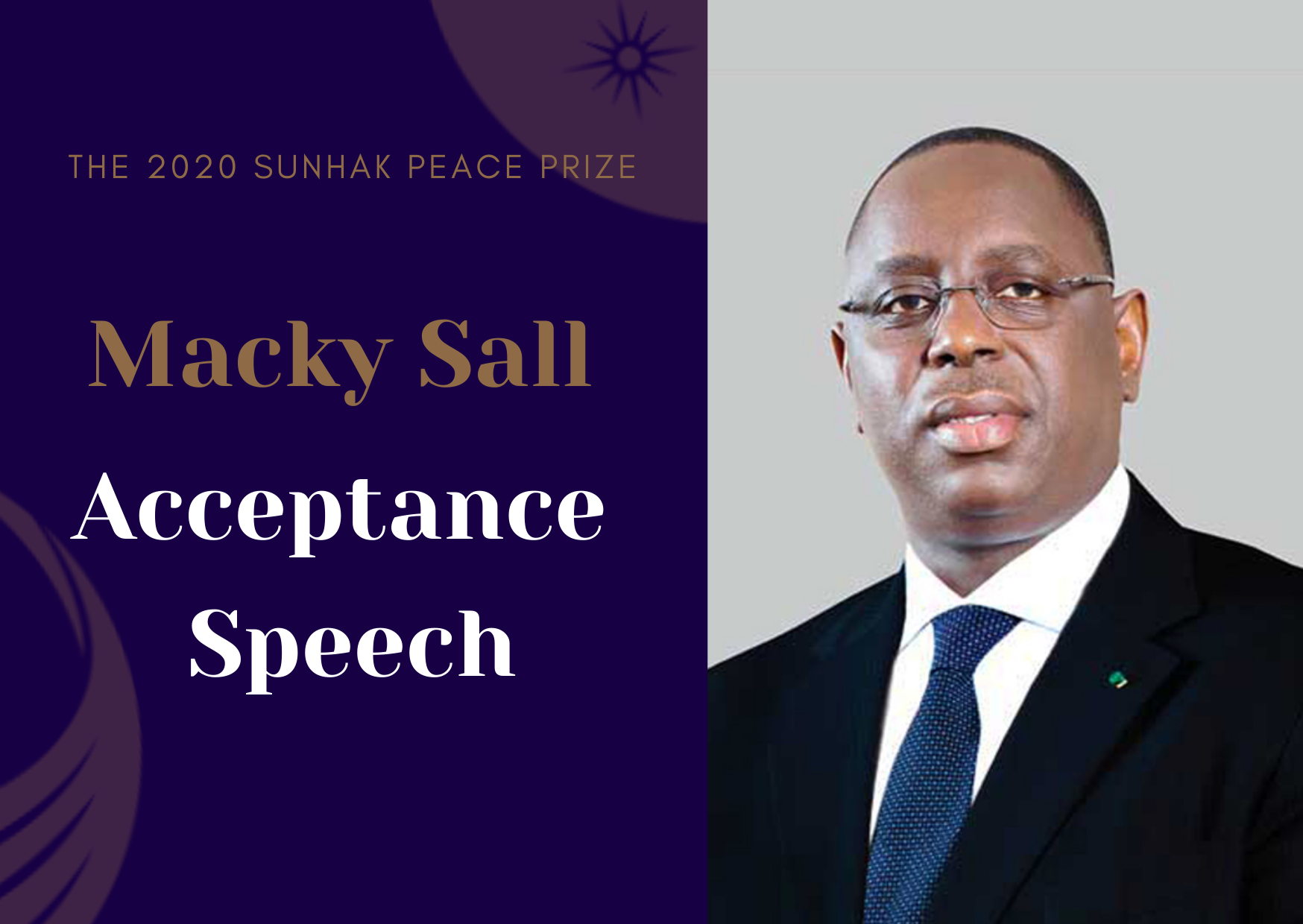
Macky Sall Acceptance Speech
Macky Sall Acceptance SpeechHonorable Dr. Hak Ja Han Moon, co-founder of the Universal Peace FederationLadies and gentlemen, dear friends, distinguished guestsThe health situation which has put the international community in a state of emergency led me to cancel the trip to Seoul I was preparing myself for.It is with the deepest regret that I was not able to join you personally as I had planned. I would like to thank my Korean counterpart President Moon Jae In for all the preparations he made for my visit. It is with deep reverence that I salute the memory of Rev. Sun Myung Moon whose centenary we celebrate this year. He was a visionary leader and the inspiration behind the Universal Peace Federation. I would like to offer my highest esteem to the honorable Dr. Hak Ja Han Moon.For several decades, Dr. Hak Ja Han Moon has been the embodiment of incredible kindness. Her life demonstrates a profound heart of superlative commitment to the cause of peace and the wellbeing of humanity. Her unique ability and lifelong dedication to comfort those in need is leading to the realization of a harmonious global community filled with love. Her dedication deserves our unending respect and admiration.I would like to once again extend to her my respect and esteem. I see the members of the Universal Peace Federation as my associates. Ladies and gentlemen, in these times of turbulence and uncertainty, there is no task more urgent than fostering dialogue to allay tensions, promote mutual understanding and support the peaceful coexistence of people. It is with this spirit that in January 2018, Senegal welcomed the inaugural Africa Summit of the Universal Peace Federation. It is with this similar spirit that I humbly accept the Sunhak Peace Prize that you have awarded me. It is with humility that I accept this prize because to me, this award is not an end in itself but an encouragement to persevere in the culture of peace and human kinship.I accept this prize with humility because I recognize the essential blessing this prize brings to the people of Senegal. Every member of the Senegalese people has always harbored a profound sense of togetherness in their diversity. This prize is greater than my humble self. it is a prize that honors the people of Senegal and I would like to dedicate it to the people of Senegal. As I accept this award, I think about all those whose peace is usurped by violence and the vicissitudes of life. I think about the victims of war and terrorism, about refugees and displaced people, about those suffering from xenophobia and racial discrimination simply because of their origin or the color of their skin. Peace is fragile.When society is characterized by indifference and the madness of self-centeredness, this society cannot take care of those most in need. Peace is threatened when extremism of all types manipulates the conscience of people and turns faith into activism to feed ideologies of conflict. Peace is threatened when some believe they are imbued with the mission of forcing unto others a unique ideology of action and existence. This stands at odds with the diversity of cultures and civilizations. It is for all these reasons that we must defend the ideal of a better world for all. That is why, in agreement with the African Union Commission, I have decided to donate the entire prize amount of 500,000 USD of the Sunhak Peace Prize to the peace fund of the African Union. I hope for this to promote efforts to realize peace continentally. This is why, as a laureate of the Sunhak Peace Prize, I will endeavor to stay faithful to the ideal that unites us. I will endeavor to pursue together with you, our common efforts for the peaceful coexistence among people, cultures and civilizations. I wish tremendous success at your gathering.
-
- 5,835
-
- 2 March 2021
-
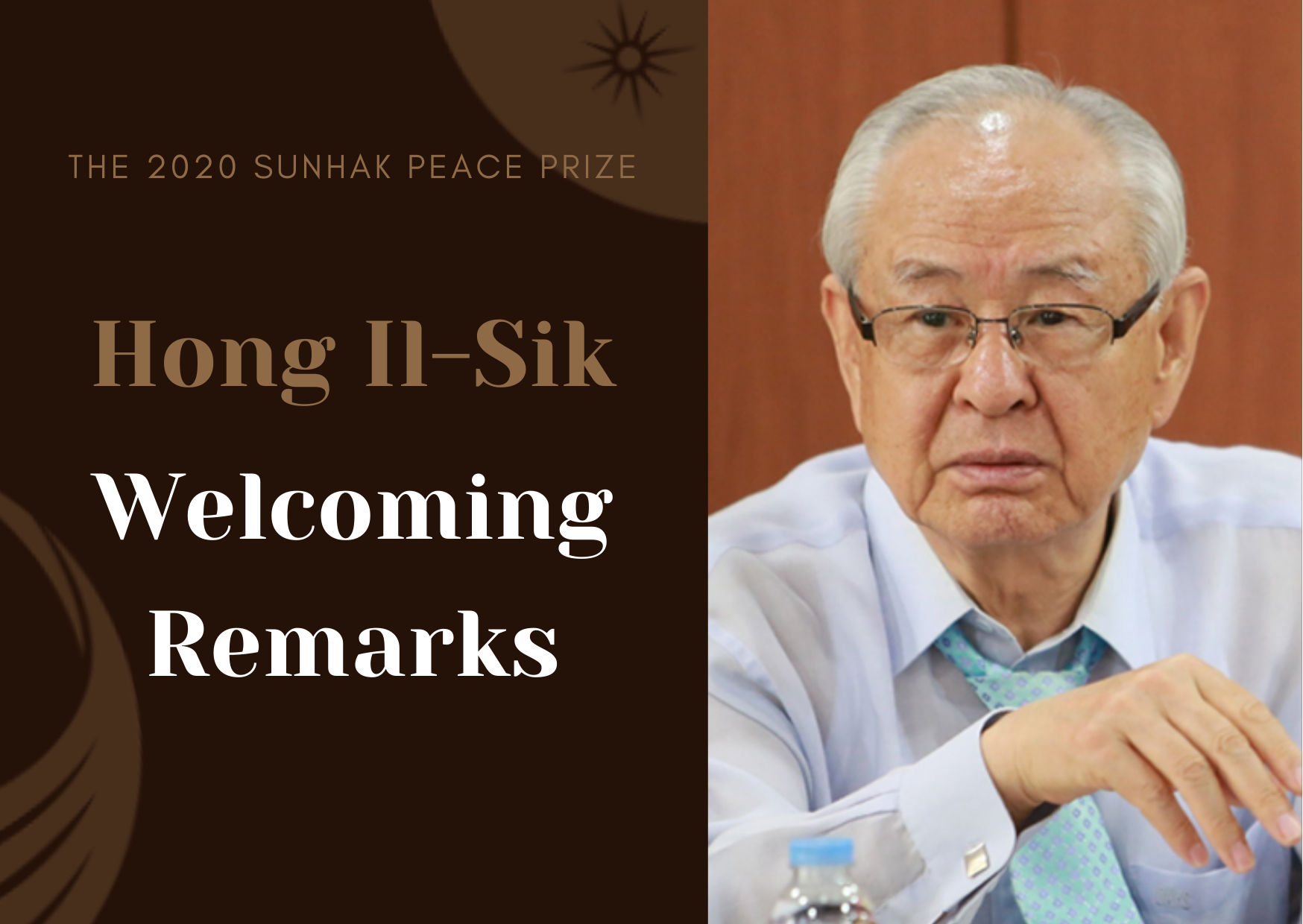
Welcoming Remarks Dr. Hong Il-sik
Welcome Remarks – Committee Chairman Dr. Hong Il-sikYour Excellencies and distinguished guests!We are gathered today to congratulate and encourage the 2020 Sunhak Peace Prize Laureates. I sincerely thank you for joining us on this special occasion. Furthermore, I would like to welcome and thank the former and current heads of states and various representatives from around the world who are here with us. This year’s award ceremony is especially meaningful as it marks the 100th anniversary of the birth of the founder, Rev. Dr. Sun Myung Moon. Above all, I would like to extend my deepest respect and sincere congratulations to this year’s laureates: Founders’ Centenary Award Laureate, former United Nations Secretary-General Ban Ki-moon, and the Sunhak Peace Prize Laureates President Macky Sall of the Republic of Senegal and International Honorary President of Religions for Peace Bishop Munib Younan. Your dedication and achievements in realizing peace for the sake of humanity have made you the heroes of today’s ceremony.The Sunhak Peace Prize was founded at the behest of Dr. Hak Ja Han Moon, the wife of the late Rev. Dr. Sun Myung Moon, to honor and preserve his ideals, legacy and achievements. In selecting this year’s laureates, the Sunhak Peace Prize Committee focused on the founders’ principles of interdependence, mutual prosperity and universally shared values to commemorate the centenary of Rev. Dr. Sun Myung Moon.Distinguished guests!Peace for humanity can only be achieved when a peaceful global community in which all nations live together in prosperity and in respect of each other is realized. As a mere student of the humanities and not a religious or political leader, I have had endless respect and the highest esteem for Rev. Moon’s insight into history of human civilization that transcends any and all secular boundaries and discrimination and for his life-long endeavor and consistency in word and action toward love and achieving peace. Rev. Moon has pioneered the path toward humanity’s common prosperity through movements that dissolved barriers, promoted the standardization of technology, and advanced religious harmony worldwide. With the heart of a father, Rev. Moon desired to embrace all humanity. I believe that his leadership of love will serve as a great lesson to the leaders around the world today who, led by national interest, are unable to see the wider and greater world and future.Distinguished guests!The founders have consistently emphasized throughout their lives that ”Peace can only be achieved when we dissolve the barriers that lie between us and help and love each other.” In a world that is becoming more and more divided, we must act swiftly to foster a culture of peace. We need to move beyond the interests of personal and narrower gain toward creating a new culture of peace for the sake of humanity’s future fate.The laureates receiving the awards today, former UN Secretary General Ban Ki-moon, President Macky Sall of the Republic of Senegal and International Honorary President of Religions for Peace Bishop Munib Younan have led the way in creating such a world. I would like to express, once again, my deepest respects and heartfelt congratulations to the three great people receiving the 2020 Sunhak Peace Prize today.Distinguished guests!The Sunhak Peace Prize will continue to discover courageous and righteous people who are dedicating their lives for humanity’s peace. Let us all create a noble culture of peace full of grace. Lastly, thank you again for joining us today and I wish you and your families peace and prosperity. Thank you. February 5, 2020Chair Hong Il-sikSunhak Peace Prize Committee Chairman
-
- 2,882
-
- 2 March 2021
-
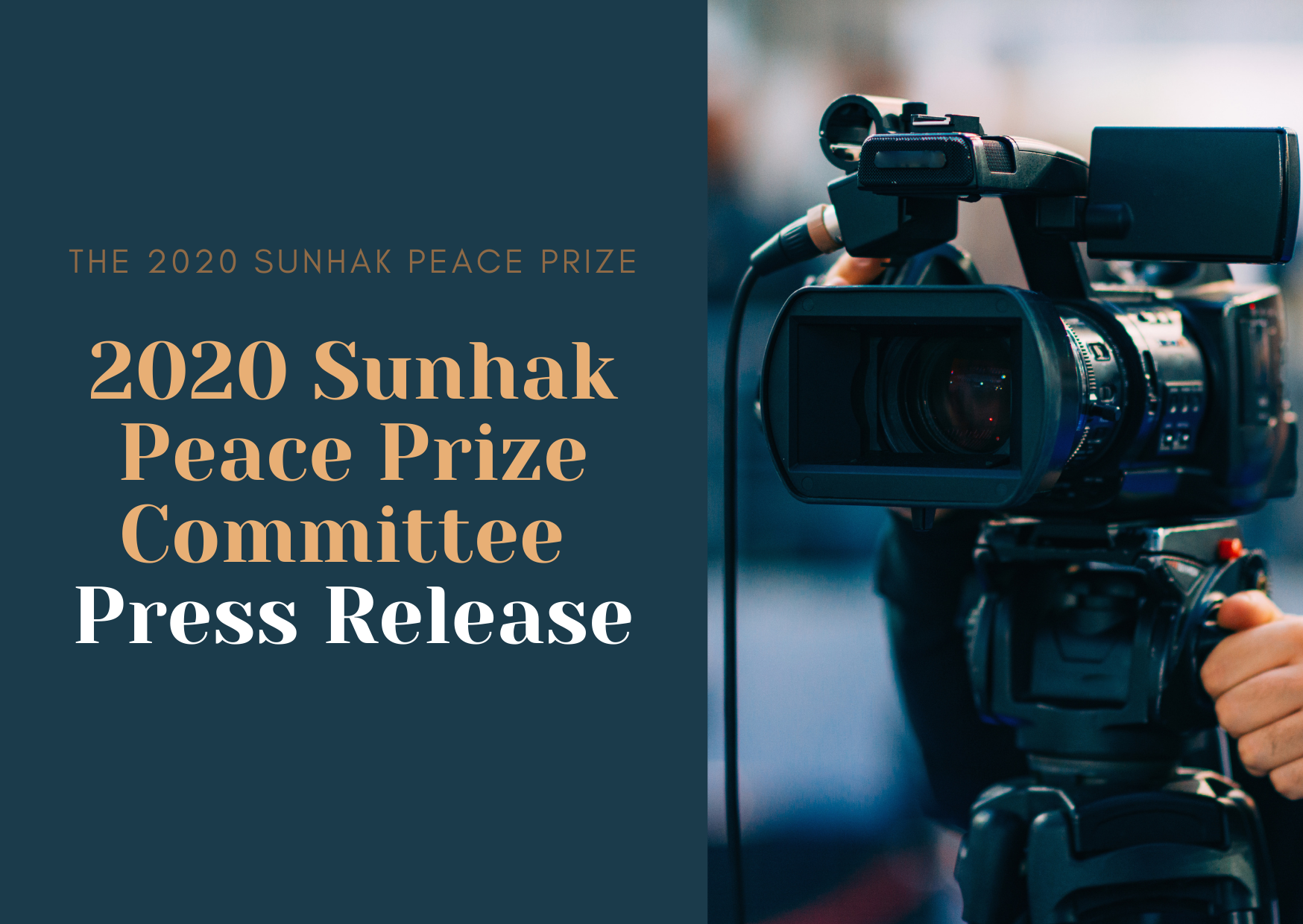
2020 Sunhak Peace Prize Committee Press Release
Making the World Better for Future GenerationsPress ReleaseRelease Date & Time: Local Time: February 5th 2020(Please release as soon as you receive)Total of 2 pages Recipient: Reporters from Social & Culture FieldsContact: +82-10-6701-7201, sunhakprize@naver.com Commemorating the Centenary of the Founders2020 Sunhak Peace Prize Award Ceremony HeldFounders’ Centenary Award LaureateBan Ki-moon (former UN Secretary-General),2020 Sunhak Peace Prize Co-RecipientsMacky Sall (Current Senegal Head of State)Munib A. Younan (International Honorary President of Religions for Peace) The Award Ceremony was held at KINTEX, Ilsan, Gyeonggi-do on February 5 (Wed.) at 10:00 More than 5000 former and current heads of states and VIP guests from over 100 countries attended the Ceremony. The Sunhak Peace Prize Committee (Chairman Hong Il-sik, former president of Korea University), held the 2020 Sunhak Peace Prize Award Ceremony commemorating the centenary of the founders at KINTEX on February 5th (Wed.) at 10:00am. President Macky Sall (age 57, President of the Republic of Senegal) and Munib A. Younan (age 69, International Honorary President of Religions for Peace) as the 2020 Sunhak Peace Prize Laureates. In addition, a special Founders’ Centenary Award was awarded to Ban Ki-moon (age 76, former UN Secretary-General). The Committee made an official announcement of the laureates at a press conference in Nagoya on October 5th, 2019. President Macky Sall was recognized for successfully shortening the presidential term from seven to five years and reviving the economy through transparent policies, thereby spreading mature democracy to neighboring countries on the African continent. Bishop Munib A. Younan, born as a Palestinian refugee in 1976, was recognized for his 40-years of work to promote harmony among Judaism, Christianity, and Islam in the Middle East and in particular to resolve the Israeli-Palestinian conflict. In addition, Former UN Secretary-General Ban Ki-moon led the UN towards achieving a sustainable world with unyielding dedication in the face of unprecedented global challenges and crises, including global economic crisis, climate change, terrorism refugee issues. In his acceptance speech, President Macky Sall emphasized that peace requires social components of inclusive economic growth that contributes to poverty eradication and reduction of inequality. He reaffirmed his determination to take lead in ending the conflicts on the African continent and achieving social and economic development. Bishop Munib A. Younan called out to the religious leaders “to raise their voices for peace based on justice and to speak boldly against the waves of hatred and oppression” and said that he “will continue to work for peace based on justice until the last breath of my life.” Former UN Secretary-General Ban stated that “there are still more than 700 million people going to bed with a hungry stomach” and that receiving this prize gave him “much more added commitment, added motivation that I should do much more because there are still many people who are yearning for peace, prosperity, and for their human rights to be respected and protected.” Chairman Hong Il-sik stated that the founder “desired to embrace all humanity with the heart of a parent” and that “his leadership of love will serve as a great lesson to the leaders around the world today who, led by national interest, are unable to see the wider and greater world and future,” He firmly emphasized the need to “move beyond the interests of personal and narrower gain toward creating a new culture of peace for the sake of humanity’s future fate” in a world that is becoming more and more divided. The ceremony was attended by more than 5,000 people, including former and current heads of states and representatives from various governmental, academic, industrial, media, and religious organizations worldwide. The Sunhak Peace Prize is awarded to individuals and organizations that have greatly contributed to the peace of future generations and human development.
-
- 2,674
-
- 2 March 2021
-
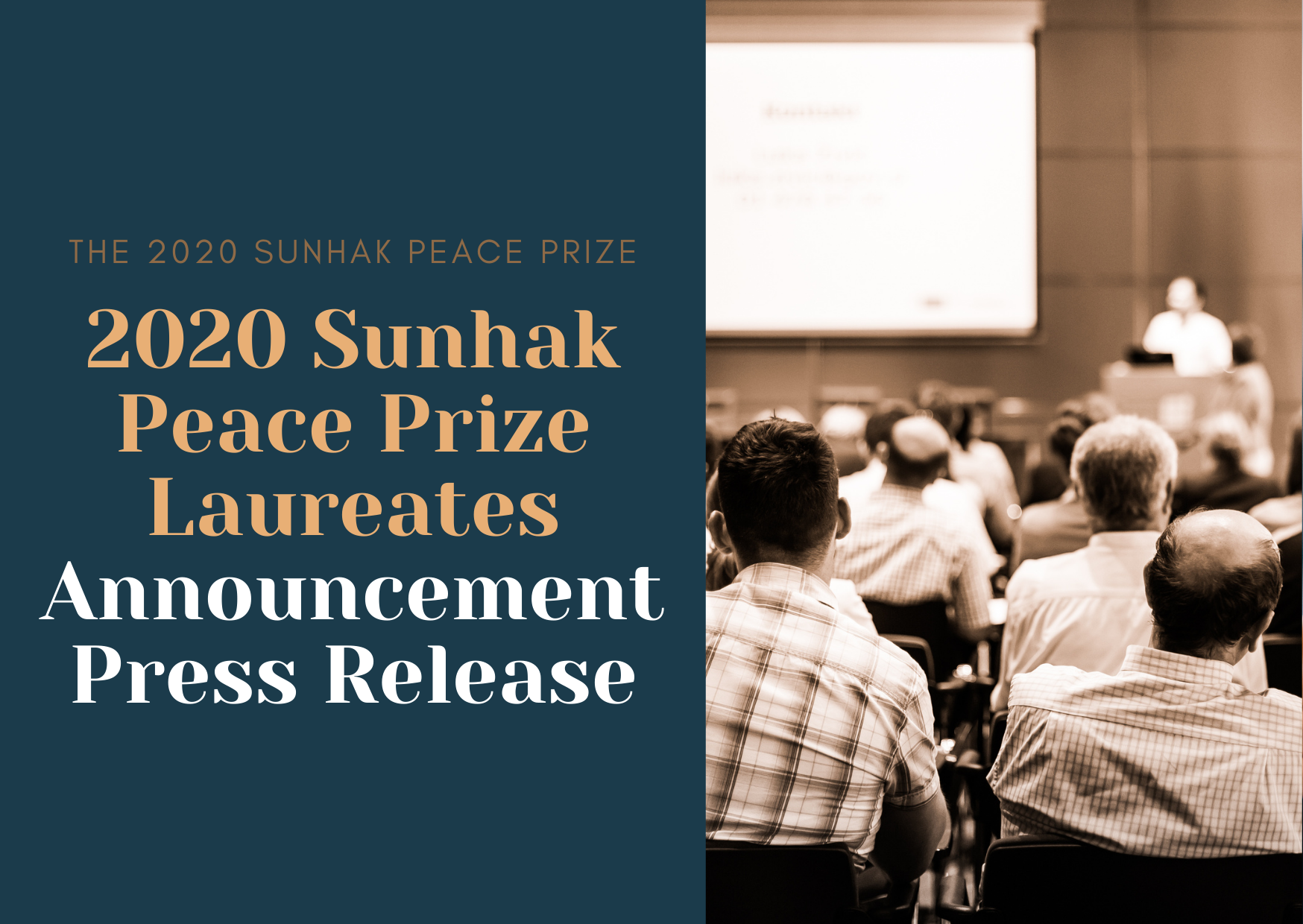
2020 Sunhak Peace Prize Laureates Announcement Press Release
Making the World Better for Future GenerationsPress ReleaseRelease Date & Time: Local Time: October 5th 2019 (Thursday) 5:00PM; GMT: October 5th 2019 (Thursday) 8:00AM (Please release after this time and date)Total of 2 pages Recipient: Reporters from Social & Culture FieldsFor more information: 02-3278-5158, +82-10-6701-7201Website: sunhakpeaceprize.org “President Macky Sall and Bishop Munib A. Younan selected as the 2020 Sunhak Peace Prize LaureatesFormer UN Secretary General Ban Ki Moon selected for the ‘Founders’Award’ ”● Announcement of laureates to be held in Nagoya, Japan, at 17:00 on Saturday, October 5th● Macky Sall (President of Senegal), a model of good governance in Africa● Munib A. Younan (Former President of the Lutheran World Federation), a pioneer for religious harmony● Ban Ki-moon (Former UN Secretary-General), a leader striving for a sustainable earth [October 5th, 17:00 Korean time][Nagoya Castle, Nagoya, Japan] The Sunhak Peace Prize Committee has selected Macky Sall (age 59, President of Senegal) and Munib A. Younan (age 70, former President of the Lutheran World Federation) as the 2020 Sunhak Peace Prize Laureates. In addition, to mark the 100th anniversary of the birth of its founder Rev. Dr. Sun Myung Moon, a special Founders’ Award will be given to Ban Ki-moon (age 76, former UN Secretary-General). President Macky Sall is being recognized for spreading mature democracy to neighbouring countries in the African continent, where dictatorship and poverty are still rampant, by successfully shortening the presidential term and leading an economic revival through transparent policy in his country. Bishop Munib A. Younan, a Palestinian refugee, is being recognized for his dedication to bring harmony among Judaism, Christianity and Islam in the Middle East region for over 40 years since his appointment as a Lutheran pastor in 1976, and for his leading role in seeking a peaceful resolution of the Israeli-Palestinian conflict. Former UN Secretary-General Ban Ki-moon, the winner of the Founders’ Award, was selected in recognition of his devotion in leading the UN toward a sustainable world in the face of unprecedented global challenges and crises, such as the global economic crisis, climate change, terrorism and refugee issues, during his term. Hong Il-sik, the Chairman of the Sunhak Peace Prize Committee, stated, “With the expansion of self-interest around the world, the spirit of cooperative internationalism that underlied the post-war world order is significantly declining. The Prize winners today are people who have committed themselves to breaking down the boundaries between people and who see each other with the ideals of cooperation and co-prosperity to create a better, peaceful world together.” The winner of the Founders’ Award, Ban Ki-moon, became the first South Korean to be elected as the UN Secretary-General in 2006, and greatly contributed to building peace during his two successful terms. In particular, he sparked international awareness of the seriousness of climate change and successfully led efforts that culminated in the 2015 Paris Agreement, a landmark measure for humanity and the planet. Ban Ki-moon also presented a framework to address global issues for a co-prosperous future of mankind through the UN Sustainable Development Goals that countries around the world are jointly pursuing. Furthermore, he has contributed greatly to formulating and implementing a global strategy for gender equality and improvement of children’s healthcare. The Sustainable Development Goals is a collection of 17 global goals for sustainable development. It will serve as a milestone agenda for achieving human prosperity by 2030, through partnership among nations and global cooperation to resolve long-standing issues such as poverty and hunger as well as the issues of economic and social polarization, deepening of social inequality, and environmental issues that have been developing globally in the 21st century. Senegalese President Macky Sall, winner of the 2020 Sunhak Peace Prize, is a leader of good governance who is spreading democracy in Africa. Elected as the 4th President of Senegal in April 2012, President Sall has been leading his country with exemplary policies of democracy, including a drastic reform that shortened the presidential term from seven to five years, as opposed to many presidents of other African countries who seek long-term ruling. In particular, President Sall\'s passionate push for \"Plan Senegal Emergent\" (Phase 1: 2014-2018 and Phase 2: 2019-2023) stabilized Senegal\'s economic growth rate at around 6 percent. The Plan Senegal Emergent is an advanced policy that focuses on increasing retirement pensions, providing emergency subsidies to farmers, holding various education-related national conferences, and improving health insurance. The policy serves as a model for the advancement of the West African economy. President Sall has upheld the rule of law and human rights, while working to eradicate poverty and promote economic development in Senegal, making Senegal one of the most stable countries on the continent. His good governance has made Senegal a role model for its neighboring countries. Bishop Munib A. Younan, also a winner of the 2020 Sunhak Peace Prize, was born in Jerusalem to Palestinian refugee parents in 1950. Growing up in Jerusalem, which became a hotspot for hatred and conflict, he came to believe that interreligious dialogue and reconciliation are fundamental to peace for humanity. Bishop Younan has devoted his entire life to promoting religious harmony among Jews, Christians and Muslims. In particular, Bishop Younan led efforts toward religious harmony on a global scale during his service as the President of the Lutheran World Federation from 2010 to 2017, building a network of religious leaders from different faiths. Through continued dialogue with the Catholic Church, the Lutheran World Federation and Catholic Church came together on a “common path\" toward unity, unraveling the deep-rooted conflict of 500 years between the two churches. In 2016, a Joint Catholic-Lutheran Commemoration of the Reformation commemorating the 500th anniversary of the Reformation was held and a joint statement declaring a common path was signed. It was the first time in history that the Pope took part in the anniversary of the Reformation. The two sides sent a strong message of religious harmony around the world stating, “Theological distinction entails prejudice and conflict, and degenerates into a tool for political purposes,” and that they “reject all past and present hatred and violence expressed in the name of religion.” The Sunhak Peace Prize discovers and awards biennially individuals and organizations that have contributed to peace and welfare of future generations. The prize of 1 million US dollars is the largest single award in the world. The winner of the Founders’ Award will receive 500,000 US dollars. The award ceremony will be held at KINTEX in Seoul, South Korea, on February 5th, 2020. Previous Sunhak Peace Prize Laureates are as follows. 2015 Laureates: H.E. Anote Tong (63, Former Kiribati President) and Dr. Modadugu Vijay Gupta (76, Ph.D in Aquaculture). 2017 Laureates: Dr. Gino Strada (68, Italian surgeon) and Dr. Sakena Yakubi (66, Afghan female educator). 2019 Laureates: Dr. Akinwumi Ayodeji Adesina (59, President of the African Development Bank) and Mrs. Waris Dirie (54, Female genital mutilation human rights activist) -End-
-
- 2,726
-
- 2 March 2021
- Sunhak Peace Prize
-
Future generations refer not only to our own physical descendants
but also to all future generations to come.Since all decisions made by the current generation will either positively
or negatively affect them, we must take responsibility for our actions.

